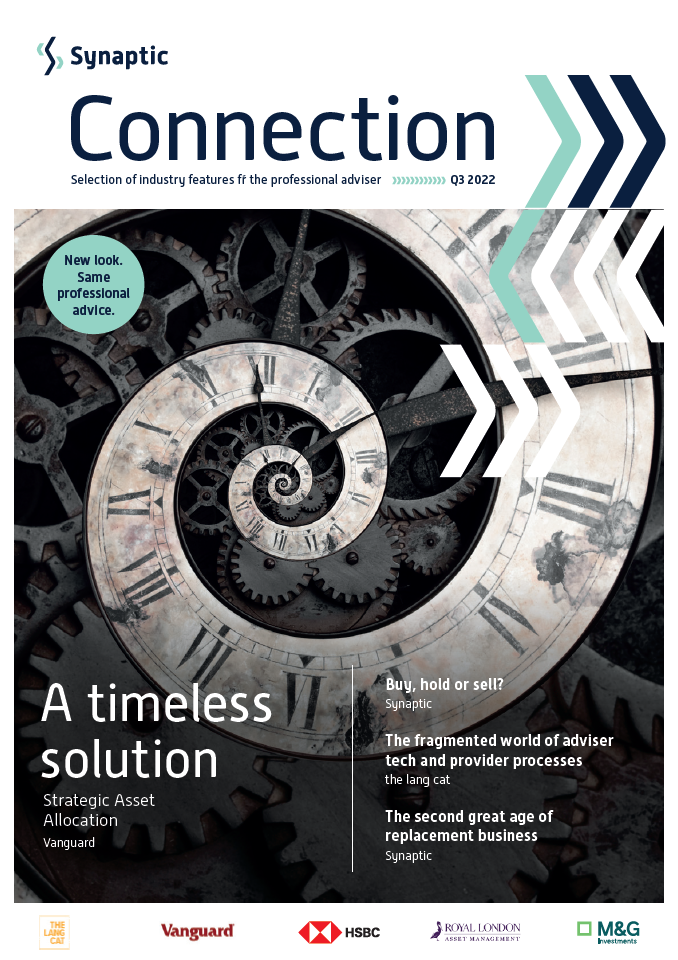In this edition...
- Strategic Asset Allocation: A timeless solution Vanguard,
- The second great age of replacement business Eric Armstrong, Client Director - Synaptic
- The fragmented world of adviser tech and provider processes Natalie Holt, Content Editor - the lang cat
- Will the Consumer Duty make your CIP obsolete Antony Champion, Head of Intermediaries - Brewin Dolphin
- Einstein, Benjamin Graham and Napoleon David Macfarlane, Team Head, Discretionary Wealth Management - HSBC Asset Management
- How IFAs can unlock a smooth ride Marc O’Sullivan, Head of Investments - Wesleyan
- Reliance on others Tim Cooper, Freelance Journalist on behalf of EBI
- Boom-bust economics is back! Be warned… John Pattullo, Co-Head of Strategic Fixed Income - Janus Henderson Investors
- Through a glass, darkly Guy Monson, Senior Partner and Chief Market Strategist - Sarasin & Partners
- Diversified income fund and impact Close Brothers , Asset Management
- Sustainable futures Mike Fox, Head of Sustainable Investments - Royal London Asset Management
- Morningstar Wealth Platform: now the real work gets underway Mark Sanderson, Director - Morningstar Wealth Platform
- A new capitalism Seeking value in Japanese equities M&G Investments,
- Is it the end of an era for the UK property market Andrew Robinson, Senior Investment Analyst - RSMR
- Buy, hold or sell? Either way, you need research to evidence your decision John Warby, Business Development Manager - Synaptic
 Back in the summer of 2019, the lang cat published a paper called A Disconnected World. This examined integration – or the lack of it – in the world of advisers and financial planners, and its impact.
Back in the summer of 2019, the lang cat published a paper called A Disconnected World. This examined integration – or the lack of it – in the world of advisers and financial planners, and its impact.
That paper ended up kick-starting an industry-wide debate around technology, system integrations and the deep frustration firms felt in wrangling seemingly simple day-to-day processes on behalf of their clients. The paper exposed how these issues hadn’t been effectively tackled, let alone solved.
Since then, obviously a lot has changed. Clients, advisers and providers have all had to learn new (home-based) ways of working, and the bar was generally raised across the financial services board when it came to digital processes.
At the same time, new adviser tech has come to market or is in development. Data, and the way that data moves, is also becoming increasingly important for advisers and planners to understand.
But for all this progress, there are some issues that remain firmly embedded in the way advisers interact with providers, platforms and tech firms on behalf of their clients.
With all this in mind, we thought it was worth revisiting what’s changed on tech and integration, what’s stayed the same and the potential solutions on the horizon.
The result is our latest report: A Fragmented World. To inform our findings, we carried out a wide range of interviews with advice professionals ranging from the big consolidators and national firms to the smaller specialists. We supplemented this with online research, and also heard from providers, platforms and tech companies.
The adviser reality
In our 2019 paper, we found a pretty bleak picture where adviser systems were concerned. For example:
- Firms could be up to 100% more efficient if their systems spoke to one another.
- 85% of firms we spoke to agreed lack of integration was a major cause of
- It would take 18 point-to-point integrations to improve the life of one firm using a single
In our latest research, we find that while technology has moved on, firms face a huge challenge in supporting and maintaining their various bits of kit.
One paraplanner at a regional advice firm told us: “There is a massive gap in the skillset required for IT implementations etc. Professional bodies need to start recognising this, and help individuals learn the necessary skills.”
With more and more tech promising the earth on integrations, it’s hard for advice firms to sort the good systems from the marketing hype. This was borne out from the findings of our online survey, where more than seven in 10 firms agree that it’s impossible to make an informed comparison on software providers.
"In our latest research, we find that while technology has moved on, firms face a huge challenge in supporting and maintaining their various bits of kit."
It will probably come as no surprise that letters of authority (LOAs) and transfers remain a massive source of frustration for those working in advice firms and financial planning practices. But the scale of harm being inflicted is pretty staggering.
When we tested the worst case scenarios for time taken from submitting an LOA to getting full, satisfactory data, the timeframe often ran to several months. In the very bad cases, firms were waiting over six months for the data they had asked for.
One managing director of a financial planning firm told us: “Technology allows our clients to go from 0-100 in terms of their engagement, but they then fall off a cliff with LOAs and transfers taking months to complete.”
Another adviser summed it up this way: “LOAs are the bane of the industry, not just for advisers but for providers as well. It makes absolutely no sense at all for everyone not to kind of join hands and try and work on this. It’s a perfect example of an industry that gone mad where we're just creating more work for everybody.”
Potential solutions, and what next?
Some firms are taking matters into their own hands, including by hiring data analysts and data scientists, to generate management information and even in some cases to build their own systems. But clearly, this isn’t an option for everyone.
We mentioned earlier about emerging tech. Developments such as Origo’s Unipass LOA service, and hubs such as Sprint’s Finio should help in providing some short to medium-term solutions.
Regulatory pressure is also being brought to bear. Consumer Duty should act to bring up standards of provider service where they are lacking, and the FCA sees data as a key plank in its strategy to prevent consumer harm. Linked to this, it makes sense that the industry works together on agreeing common data standards, so that clients’ money can move freely if they want it to, and in the overall spirit of transparency.
There’s a lot of talk just now about APIs (Application Programming Interfaces) and data feeds. This is a whole other topic in itself (and one we devote a bit of time to in our paper). Suffice to say APIs, which are a way for systems to talk to one another, are a sign of great progress. But they also require a lot of ongoing work, and can cause concerns around security and fraud prevention.
A collaborative approach on all of the above will work wonders in genuinely making advice professionals’ lives easier, and in turn plugging the gaps and failures that clients are currently experiencing.
Until such time, those working in advice will keep having to find a way through.
Get in touch
For more insight and research from the lang cat, and to find out what else we’re up to, visit:
langcatfinancial.co.uk
Sign up for updates
Keep up to speed with everything you need to know each quarter, by email or post.


